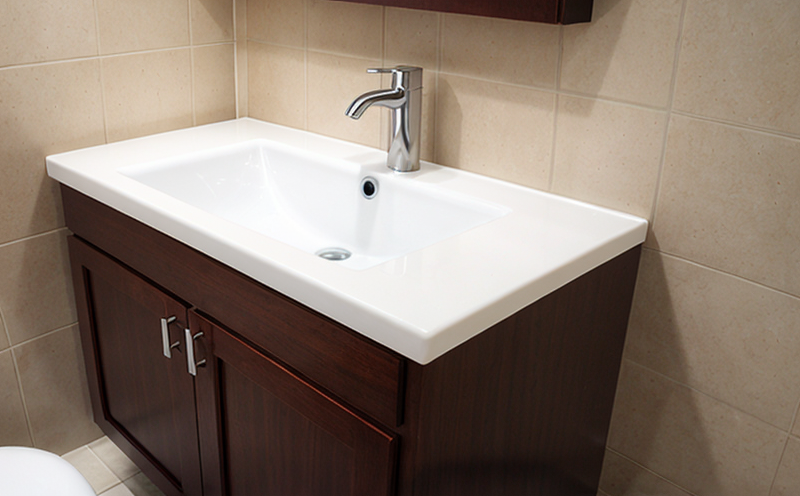NF EN 12164 Strength Testing of Plastic Bathroom Fixtures
The NF EN 12164 standard is a European Norm that specifies the methods for determining the strength properties of plastic bathroom fixtures. This service ensures that products meet stringent quality and safety standards, which are crucial for consumer protection in the sanitary sector.
Strength testing under this standard involves subjecting plastic bathroom fixtures to various mechanical loads to assess their resistance to deformation and failure. The primary focus is on evaluating the structural integrity of components such as shower chairs, bath seats, and other similar products.
The test methods outlined in NF EN 12164 are designed to simulate real-world usage conditions, ensuring that products can withstand the stress they will encounter during daily use. This includes static load tests and dynamic impact resistance assessments. By adhering to these standards, manufacturers ensure compliance with international regulations and enhance their marketability.
For quality managers and R&D engineers, understanding the nuances of NF EN 12164 is essential for developing products that not only meet but exceed regulatory requirements. Compliance officers play a critical role in ensuring that all production processes adhere to these standards, thereby protecting consumer safety.
The testing process typically begins with specimen preparation. Specimens are selected based on their intended use and must be representative of the product's design and materials. Once prepared, they undergo mechanical loading using specialized equipment designed to simulate various stress scenarios encountered in bathrooms.
Dynamic impact resistance tests assess how well a fixture can withstand sudden impacts, which is particularly important for products like shower chairs that might experience accidental collisions or falls. Static load tests evaluate the maximum weight a fixture can support without sustaining damage. These tests are conducted using calibrated machines capable of applying precise loads.
After testing, detailed reports are generated summarizing the results. Compliance with NF EN 12164 ensures that products meet specified strength criteria, providing assurance to consumers and businesses alike. This service not only helps in maintaining high-quality standards but also aids in product development by identifying potential weaknesses early.
For R&D engineers, this testing is invaluable for refining designs and materials. By understanding the performance parameters outlined in NF EN 12164, they can make informed decisions that enhance durability and user safety. For procurement teams, ensuring suppliers meet these standards is crucial for maintaining product integrity throughout the supply chain.
The NF EN 12164 standard contributes significantly to consumer protection by setting benchmarks for product strength and durability. This ensures that bathroom fixtures are safe and reliable, promoting trust among consumers and businesses.
Customer Impact and Satisfaction
Implementing NF EN 12164 strength testing services directly impacts customer satisfaction by ensuring product reliability and safety. Consumers expect bathroom fixtures to be durable and capable of withstanding regular use without compromising on aesthetics or comfort.
By adhering to this standard, manufacturers can demonstrate their commitment to quality, which translates into increased customer trust and loyalty. This is particularly important in the sanitary sector where products must perform consistently over time.
The testing process not only improves product performance but also enhances brand reputation. Customers are more likely to choose brands that prioritize safety and reliability, leading to higher sales and market share.
From a compliance standpoint, meeting NF EN 12164 ensures that products meet international standards, facilitating easier exportation and market entry in countries that recognize this standard. This can open up new markets for manufacturers, broadening their customer base.
In summary, NF EN 12164 strength testing services play a pivotal role in enhancing customer satisfaction by ensuring product reliability and safety. This aligns with the broader goals of quality management and compliance, ultimately contributing to business success and consumer confidence.
International Acceptance and Recognition
The NF EN 12164 standard is widely recognized across Europe and other regions that adopt European Norms. Its acceptance in the sanitary sector highlights its relevance and importance in ensuring product quality.
Many countries outside of Europe also reference this standard as a benchmark for strength testing, reflecting its global significance. This recognition ensures that products tested according to NF EN 12164 are accepted internationally, reducing the need for additional certifications or tests.
The standard is based on international standards such as ISO and ASTM, which further enhances its credibility and acceptance globally. Compliance with NF EN 12164 not only ensures product quality but also facilitates smoother trade processes by aligning with recognized global benchmarks.
For businesses operating in multiple regions, adhering to this standard simplifies compliance efforts and reduces costs associated with navigating different regulatory frameworks. This makes it easier for manufacturers to expand their operations internationally while maintaining consistent product quality standards.
Environmental and Sustainability Contributions
- Eco-friendly Materials: Testing ensures that materials used in bathroom fixtures are not only strong but also environmentally friendly. This promotes the use of sustainable, recyclable plastics.
- Energy Efficiency: By ensuring products can withstand prolonged use without degradation, NF EN 12164 helps reduce waste and the need for frequent replacements, conserving resources.
- Waste Reduction: Products that meet this standard are more likely to have a longer lifespan, reducing end-of-life waste. This supports recycling programs and minimizes environmental impact.
- Water Conservation: Durable fixtures contribute to water conservation by ensuring efficient use of resources without compromising functionality.





